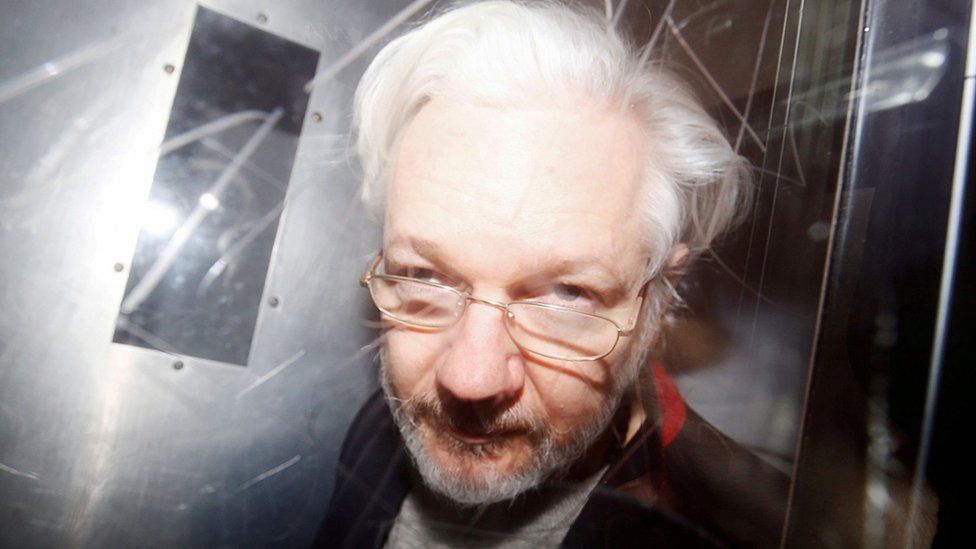
Assange is wanted by the American authorities over documents leaked in 2010 and 2011 (file photo)
By Dominic Casciani
Home and legal correspondent
Lawyers for Julian Assange are launching what could be his final bid to avoid extradition to the US to face trial over leaking military secrets.
The two-day hearing at the High Court in London is due to hear his team argue he should be allowed a full appeal.
There is no guarantee that will be granted and if turned down, he could be handed over within weeks.
Supporters of the Wikileaks founder say he exposed wrongdoing, but the US says Mr Assange put lives at risk.
Some supporters started gathering outside court hours ahead of Tuesday’s hearing, waving placards featuring the words “Drop the charges”.
Stella Assange thanked them for their backing and addressing them from a stage outside court said: “We have two big days ahead. We don’t know what to expect, but you’re here because the world is watching.”
Jodie Asard had travelled to London from Adelaide with her son to show support and said: “It’s probably the trial of the century to be honest in regards to free speech, free press and our right to know, so that’s why I’m here”.
Also outside court was Tim Dawson from the International Federation of Journalists, who said the case would make reporters think twice about publishing stories.
Originally from Australia, Mr Assange’s mammoth legal battle began in 2010 when Wikileaks disclosed huge numbers of confidential military files from the wars in Iraq and Afghanistan – including footage showing a United States helicopter gunning down civilians in Baghdad.
He took refuge for seven years in the Ecuadorian embassy in London, before being arrested by the Metropolitan Police in 2019.
The US demanded his extradition from the UK that year, saying the disclosures endangered lives.
Two years later, a British judge ruled that while the US had shown it had a legitimate criminal case against Mr Assange, he could not be transferred because he may try to harm himself.
The US later overturned that ruling after giving the UK new assurances about how it said Mr Assange would be humanely treated, including the possibility of spending any possible jail sentence in his native Australia.
Image source, Reuters
Supporters of Julian Assange outside court argue that freedom of speech is a key part of the case
Its lawyers have also repeatedly denied claims from Mr Assange’s campaign that he could be sentenced to 175 years in jail.
At this week’s hearing, Mr Assange’s lawyers are expected to ask for permission to challenge the extradition order signed by the then UK home secretary Priti Patel almost two years ago.
If they fail to convince judges there is anything wrong with that order, Mr Assange must be extradited within 28 days – unless he can convince the European Court of Human Rights to temporarily stop the aeroplane with a so-called “Rule 39” order.
Nick Vamos, the former head of extradition at the Crown Prosecution Service, said US Marshals could arrive in London within days if the High Court throws the case out.
“There is a very high threshold for [the European Court of Human Rights to intervene], namely that there is ‘an imminent risk of irreparable damage’ to his human rights, which of course is one of the arguments the High Court in London would have just rejected,” he said.
Speaking to the BBC on Monday, Stella Assange said her husband would not survive in a US jail – and the case is politically-motivated.
“This case will determine if he lives or dies,” she said.
Mr Assange has been kept at London’s Belmarsh Prison since 2019 as the US extradition case proceeded.








